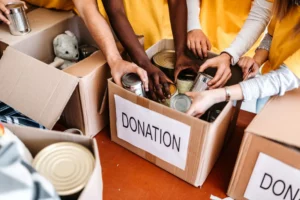 In the highlands of Bougainville’s Siwai District, the terrain is rugged, communities are resilient, and history runs deep. It’s here, in one of the Pacific’s most isolated and culturally rich regions, that the Collective Empowerment Foundation (CEF) is building a carefully considered and community-driven partnership with The Kainake Project.
In the highlands of Bougainville’s Siwai District, the terrain is rugged, communities are resilient, and history runs deep. It’s here, in one of the Pacific’s most isolated and culturally rich regions, that the Collective Empowerment Foundation (CEF) is building a carefully considered and community-driven partnership with The Kainake Project.
This collaboration, formalised through a signed agreement between both organisations , is more than a logistical arrangement—it is a shared commitment to ethical, culturally attuned, and impactful development. Together, CEF and the Kainake Project are laying the foundations for a model of cooperation that prioritises local voice, community ownership, and lasting empowerment.
Why This Partnership Exists
The Kainake region has long been shaped by the challenges of isolation—first due to mountainous terrain, and later as a result of decades of civil unrest. These conditions have made meaningful development slow and difficult, particularly when external actors have lacked local understanding or imposed unsuitable models.
CEF’s approach in Bougainville, however, begins from a place of humility. Recognising the importance of trusted local leadership and context-specific knowledge, CEF established a formal partnership with the Kainake Project, represented by Bougainvillean academic and community leader Dr. Jeffery Noro.
The purpose of the partnership is clear: to combine CEF’s technical, financial, and strategic capacity with the Kainake Project’s deep local insight, cultural leadership, and logistical support, ensuring that all development activities reflect the realities and priorities of the people they aim to serve.
Roles and Responsibilities
Under the terms of the partnership , Dr. Noro and the Kainake Project serve as CEF’s official in-country representative in Bougainville. Their contributions include:
- Providing local guidance and cultural context to help CEF navigate the region respectfully.
- Assisting with logistics, transportation, and on-the-ground coordination for CEF’s fieldwork.
- Acting as a liaison with community leaders and ensuring that CEF’s work aligns with local customs and expectations.
In turn, CEF—represented by Director and COO Kai Hang—commits to:
- Conducting all activities with full transparency and in alignment with the shared values of the partnership.
- Ensuring that project planning, implementation, and evaluation are conducted collaboratively.
- Maintaining clear communication and joint accountability across all activities.
A Partnership Built on Shared Principles
At the core of the CEF–Kainake Project partnership is a set of guiding principles that go beyond typical development practice:
1. Co-Design and Communication
Rather than delivering pre-set programs, both parties have agreed to co-develop all projects, beginning with CEF’s January 2025 field assessment. This ensures that initiatives are rooted in local priorities and co-owned by the community.
The partnership will maintain regular communication, including quarterly reviews, to monitor progress, reassess priorities, and refine activities based on learning and feedback.
2. Cultural Sensitivity and Mutual Respect
All of CEF’s work in Bougainville is conducted with deep respect for local customs, traditions, and land-based knowledge systems. The Kainake Project ensures that cultural protocols are understood and honoured at every stage, from community consultations to infrastructure implementation.
In return, the Kainake Project recognises CEF’s mission to empower some of the world’s most remote and forgotten communities—and supports that work by helping bridge the cultural and logistical gap between global systems and local realities.
3. Shared Accountability and Financial Transparency
All activities are governed by clear mutual accountability mechanisms:
- Each party signs off on their responsibilities for specific projects.
- Funds transferred between CEF and the Kainake Project must be supported by comprehensive reports and receipts.
- Every expenditure is tied to a shared goal of empowering communities and must directly support that mission.
This level of transparency ensures that development is not only effective, but also ethical and accountable.
Building a Model for the Future
This partnership represents more than a single fieldwork effort. It is a long-term commitment to developing new models of partnership that respect local leadership, elevate community agency, and demonstrate that ethical development is not only possible—but essential.
As the relationship deepens, CEF and the Kainake Project plan to expand their collaboration to include:
- Ongoing joint project design and delivery.
- Research partnerships that support culturally grounded policy work.
- Community-led monitoring and feedback mechanisms.
The goal is not just to implement one project in one place—but to co-create a replicable, resilient framework for place-based development across Bougainville and beyond.
In Summary
The partnership between the Collective Empowerment Foundation and the Kainake Project is built on a foundation of trust, shared values, and mutual respect. It reflects what ethical, inclusive development should look like: two organisations, one international and one local, working side by side to support communities on their own terms.
Together, CEF and the Kainake Project are not only delivering infrastructure and opportunity—they are redesigning how development is done, centring the voices of those most affected and ensuring that every action taken is rooted in cooperation, consent, and community.
🌍 To learn more about this partnership or how you can support community-led development in Bougainville, contact us at
📧 contact@collectiveempowermentfoundation.org


